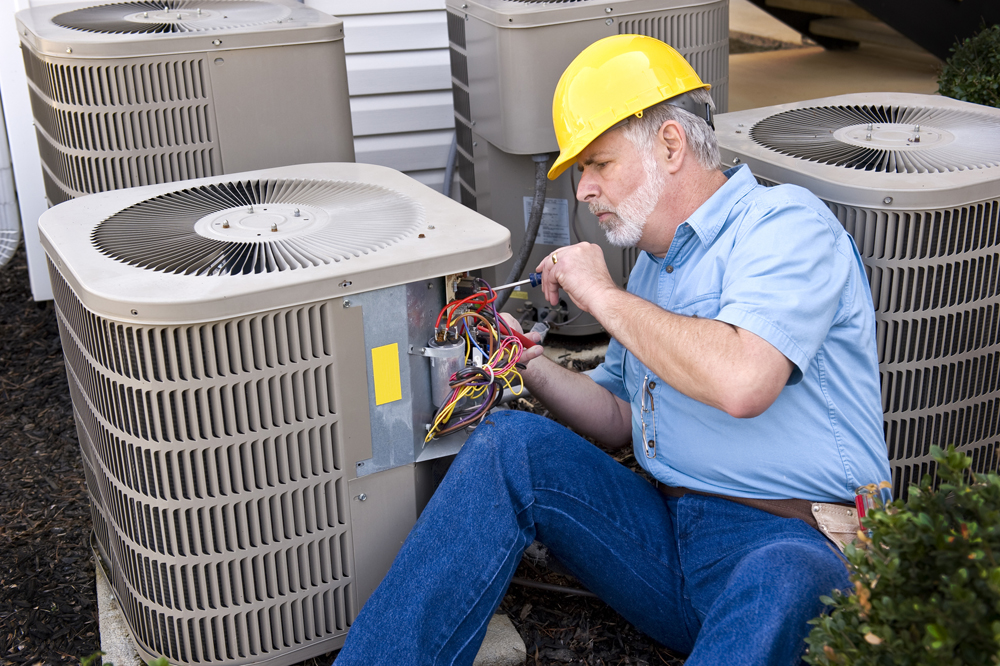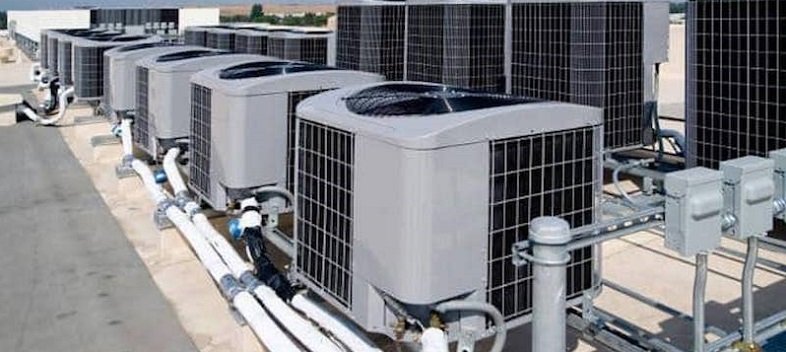Warning Signs It's Time for a furnace replacement
Warning Signs It's Time for a furnace replacement
Blog Article
Selecting Between a Warmth Pump and Heater: Trick Considerations for Your HVAC Demands
When examining home heating choices for cooling and heating needs, the decision between a heat pump and a heating system can be complicated. Each system provides unique advantages customized to specific environments and power effectiveness goals. Understanding these distinctions is necessary for making an informed selection. Key elements such as installment costs and ecological effect better make complex the option procedure. Which option absolutely aligns with one's convenience and sustainability preferences? The complying with areas will certainly explore these considerations carefully.
Recognizing Heat Pumps: Exactly How They Work and Their Benefits
While many property owners think about numerous home heating options, comprehending just how heatpump feature and their advantages can significantly affect their decision. Heat pumps run by transferring warm instead of creating it. In the winter season, they remove warmth from the outside air or ground and transfer it inside, while in the summer season, they reverse this process, cooling the home by eliminating heat outside. This double capability makes them flexible for year-round climate control.One of the main advantages of heatpump is their power performance. They use significantly much less electrical energy compared to standard furnace, possibly leading to reduced energy costs (furnace replacement). In addition, warm pumps have a smaller sized carbon footprint, making them an environmentally friendly selection. They also call for less maintenance than traditional systems, adding to lasting cost savings. In general, understanding the technicians and benefits of heatpump can help homeowners make educated decisions concerning their home heating and cooling down requirements
Checking Out Furnaces: Kinds, Operation, and Benefits
Heaters are available in different kinds, including gas, electrical, and oil versions, each with unique functional systems. Understanding these distinctions is vital, as they affect performance and home heating efficiency. In addition, heating systems use various advantages, such as regular warm output and reliability in cooler climates.
Kinds of Heaters
Heating unit can differ substantially in style and operation, with furnaces being a prominent choice amongst property owners. There are a number of kinds of furnaces, each making use of different gas sources and technologies. Gas heaters prevail, leveraging gas to create heat effectively. Electric furnaces, on the various other hand, utilize electrical resistance to produce warmth, frequently favored for their straightforward installment. Oil heating systems, while much less typical, work in areas with restricted gas accessibility (heat pump installation ooltewah tn). Furthermore, condensing heating systems maximize energy performance by reusing and recording exhaust gases. Each kind operates with a system of warm exchangers and ductwork to distribute cozy air throughout a home. Recognizing the differences between these furnace kinds is crucial for notified cooling and heating decisions
Advantages of Heaters
For property owners seeking reputable heat throughout cool months, the advantages of furnaces are considerable. Heaters offer consistent home heating, guaranteeing also temperatures throughout the home. They are especially efficient in severe cool, frequently exceeding heatpump in freezing conditions. Numerous kinds, including gas, electrical, and oil furnaces, provide versatility to satisfy diverse requirements and preferences.Furnaces likewise have a tendency to have lower preliminary setup expenses contrasted to heatpump, making them a more accessible alternative for many. Their durable design adds to a longer life-span, with several systems lasting over 15 years with appropriate maintenance. Furthermore, modern furnaces are usually equipped with sophisticated modern technology for enhanced effectiveness, which can result in decreased power costs. On the whole, heaters stay a dependable choice for effective home heating.

Power Effectiveness: Contrasting Heat Pumps and Furnaces
When contrasting power effectiveness in between heatpump and heating systems, the Seasonal Power Effectiveness Proportion (SEER) plays an important function in establishing performance. Furthermore, a functional expense analysis reveals the long-lasting economic implications of each system. Comprehending these variables can direct home owners in making informed decisions about their home heating solutions.
Seasonal Energy Efficiency Ratio
Energy effectiveness plays a crucial function in the decision-making process between heatpump and heaters, particularly when considering the Seasonal Energy Efficiency Ratio (SEER) This statistics measures the cooling effectiveness of heatpump over a whole cooling season, offering a standardized method to assess efficiency. Higher SEER ratings show better energy performance, translating to reduced energy intake and decreased energy costs. On the other hand, heaters are commonly examined making use of the Annual Gas Utilization Effectiveness (AFUE) ranking, which shows home heating efficiency. When contrasting these 2 systems, homeowners need to focus on SEER scores for warm pumps, as they straight impact total power savings and ecological sustainability. A thorough understanding of SEER can especially affect the long-lasting complete satisfaction and cost-effectiveness of the chosen HVAC option.
Operational Price Analysis
Understanding the operational expenses connected with warm pumps and heating systems is important for house owners reviewing their options. Warm pumps commonly offer higher power efficiency, transforming electric energy right into heat with marginal waste. This results in reduced regular monthly utility expenses, especially in moderate climates. On the other hand, traditional heaters, especially gas versions, may have reduced upfront prices however can incur greater functional expenses over time due to sustain prices and efficiency ratings.Moreover, heatpump can function as both heating and cooling down systems, possibly decreasing the requirement for different a/c devices. While preliminary financial investments for heatpump might be greater, their long-term financial savings in energy efficiency can make them a much more cost-effective option for lots of households. Careful evaluation of regional energy prices is important to identify the very best alternative.
Installment Costs: What to Expect for Each Home Heating System
Installment prices for home heating systems can differ significantly in between heatpump and furnaces, influencing property owners' choices. Heatpump usually have higher in advance setup costs, generally varying from $3,500 to $8,000, depending on the unit dimension and intricacy of installation. This consists of the exterior device, indoor handling system, and necessary ductwork modifications. Conversely, furnaces tend to have lower first prices, averaging in between $2,500 and $6,000, which can be appealing for budget-conscious homeowners. However, setup expenses can increase if considerable ductwork is required.Moreover, the option of fuel kind for furnaces-- gas, gas, or electric-- can likewise influence installment prices. While heatpump provide energy effectiveness, their preliminary investment may deter some purchasers. Eventually, assessing installation expenses along with long-lasting savings and efficiency will certainly help home owners in making notified choices regarding their heating unit.
Environment Factors To Consider: Which System Does Better in Your Location
How do environment conditions influence the performance of heating systems? The performance of heatpump and heaters can differ substantially relying on the regional environment. In moderate climates, warm pumps succeed by effectively transferring warm from the outdoors air, making them an energy-saving option. Nonetheless, their effectiveness lessens in incredibly cool temperatures, where they might struggle to draw out enough heat. Conversely, heaters, especially gas designs, give reputable and consistent warm no matter outside problems, making them more suitable in chillier regions.In locations that experience milder winter seasons, heat pumps can operate successfully year-round, offering both heating & cooling. In comparison, areas with harsh winters usually gain from the effectiveness of furnaces. Ultimately, comprehending the regional climate is essential when choosing between a heatpump and a furnace, as it directly impacts their operational efficiency and overall efficiency.
Upkeep Needs: Long-Term Look After Heat Pumps vs. Furnaces
While both heat pumps and furnaces call for routine maintenance to guarantee peak efficiency, their particular demands and care regimens differ substantially. Heating systems normally require less constant interest, with annual assessments sufficing to check for gas leaks, tidy filters, and examine general capability. Their easier style usually permits straightforward repairs.In contrast, warmth pumps require semiannual maintenance as a result of their double function in cooling and heating. This consists of cleansing coils, inspecting refrigerant levels, and making certain that both the outside and indoor devices function at their best. In addition, heatpump maintenance usually involves even more detailed elements, making specialist maintenance essential.Neglecting upkeep can lead to decreased performance and check increased power prices for both systems. Inevitably, house owners must take into consideration these long-term care requirements when picking between a heatpump and a furnace, as proactive maintenance can extend the life expectancy and performance of either system substantially.
Ecological Impact: Selecting a Lasting Home Heating Choice
The environmental effect of furnace is an essential analysis for house owners seeking sustainable choices. Heatpump are normally more energy-efficient than standard heaters, as they move warm rather than create it, greatly decreasing carbon emissions. By using renewable resource resources, such as air-source or geothermal heatpump, house owners can further minimize their environmental footprint.On the look at this web-site various other hand, natural gas heating systems give off greenhouse gases and add to air pollution, though they commonly supply higher heat outcome. Advancements in innovation have actually led to the growth of high-efficiency heaters that reduce emissions.Ultimately, picking a home heating system entails evaluating effectiveness against environmental influence. Home owners are urged to review local energy resources and incentives for eco-friendly systems, ensuring an option that aligns with both individual convenience and environmental responsibility. The decision affects not only prompt comfort however also long-term sustainability and ecological health and wellness.
Often Asked Inquiries
Exactly How Lengthy Do Heat Pumps and Furnaces Typically Last?
The life-span of warm pumps usually varies from 15 to two decades, while furnaces can last between 15 to three decades. Regular maintenance substantially impacts their long life and performance in supplying heating options.
Can I Use a Heatpump in Extremely Cold Climates?
Heatpump can operate in incredibly chilly climates, yet their efficiency reduces as temperatures drop. In such conditions, supplemental heating sources might be required to keep comfortable interior temperatures and ensure peak performance.

What Is the Sound Level of Heat Pumps Versus Furnaces?
The noise degrees of heatpump and furnaces vary considerably. Typically, heatpump run more silently than conventional heaters, making them more effective for those delicate to sound, while heaters may produce louder functional noises throughout heating cycles.
Are Warm Pumps Suitable for Both Heating and Cooling?
Heatpump are indeed suitable for both heating & cooling (furnace replacement). They operate by transferring heat, giving effective temperature level control year-round, making them a versatile option for house owners seeking an all-in-one heating and cooling option
What Dimension Furnace Do I Required for My Home?
Figuring out the ideal dimension heater for a home calls for evaluating elements such as square video, insulation high quality, regional climate, and the home's layout. Consulting an expert can ensure an exact evaluation and suitable comfort. Warm pumps typically provide higher power performance, transforming electric power right into warmth with marginal waste. In modest environments, heat pumps stand out by efficiently transferring warm from the outdoors air, making them an energy-saving alternative. On the other hand, heating systems, especially gas versions, provide constant and trusted warmth regardless of exterior problems, making them more suitable in chillier regions.In areas that experience milder winters months, warm pumps can run efficiently year-round, giving both heating and air conditioning. Warmth pumps are normally extra energy-efficient than conventional heating systems, as they move warm instead than create it, considerably decreasing carbon Related Site discharges. By utilizing renewable energy resources, such as geothermal or air-source heat pumps, property owners can further reduce their ecological footprint.On the various other hand, natural gas heaters produce greenhouse gases and add to air pollution, though they commonly give higher warm result.
Report this page